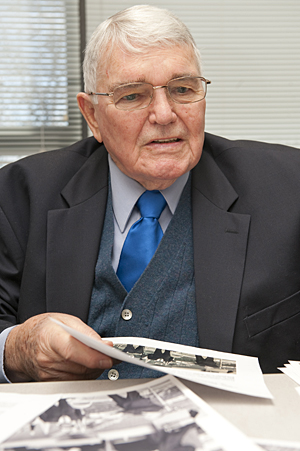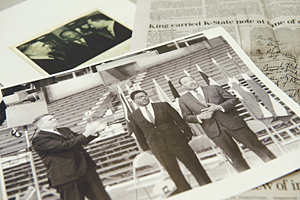ADVERTISEMENT
- Rozovsky wins prestigious NSF Early Career Award
- UD students meet alumni, experience 'closing bell' at NYSE
- Newark Police seek assistance in identifying suspects in robbery
- Rivlin says bipartisan budget action, stronger budget rules key to reversing debt
- Stink bugs shouldn't pose problem until late summer
- Gao to honor Placido Domingo in Washington performance
- Adopt-A-Highway project keeps Lewes road clean
- WVUD's Radiothon fundraiser runs April 1-10
- W.D. Snodgrass Symposium to honor Pulitzer winner
- New guide helps cancer patients manage symptoms
- UD in the News, March 25, 2011
- For the Record, March 25, 2011
- Public opinion expert discusses world views of U.S. in Global Agenda series
- Congressional delegation, dean laud Center for Community Research and Service program
- Center for Political Communication sets symposium on politics, entertainment
- Students work to raise funds, awareness of domestic violence
- Equestrian team wins regional championship in Western riding
- Markell, Harker stress importance of agriculture to Delaware's economy
- Carol A. Ammon MBA Case Competition winners announced
- Prof presents blood-clotting studies at Gordon Research Conference
- Sexual Assault Awareness Month events, programs announced
- Stay connected with Sea Grant, CEOE e-newsletter
- A message to UD regarding the tragedy in Japan
- More News >>
- March 31-May 14: REP stages Neil Simon's 'The Good Doctor'
- April 2: Newark plans annual 'wine and dine'
- April 5: Expert perspective on U.S. health care
- April 5: Comedian Ace Guillen to visit Scrounge
- April 6, May 4: School of Nursing sponsors research lecture series
- April 6-May 4: Confucius Institute presents Chinese Film Series on Wednesdays
- April 6: IPCC's Pachauri to discuss sustainable development in DENIN Dialogue Series
- April 7: 'WVUDstock' radiothon concert announced
- April 8: English Language Institute presents 'Arts in Translation'
- April 9: Green and Healthy Living Expo planned at The Bob
- April 9: Center for Political Communication to host Onion editor
- April 10: Alumni Easter Egg-stravaganza planned
- April 11: CDS session to focus on visual assistive technologies
- April 12: T.J. Stiles to speak at UDLA annual dinner
- April 15, 16: Annual UD push lawnmower tune-up scheduled
- April 15, 16: Master Players series presents iMusic 4, China Magpie
- April 15, 16: Delaware Symphony, UD chorus to perform Mahler work
- April 18: Former NFL Coach Bill Cowher featured in UD Speaks
- April 21-24: Sesame Street Live brings Elmo and friends to The Bob
- April 30: Save the date for Ag Day 2011 at UD
- April 30: Symposium to consider 'Frontiers at the Chemistry-Biology Interface'
- April 30-May 1: Relay for Life set at Delaware Field House
- May 4: Delaware Membrane Protein Symposium announced
- May 5: Northwestern University's Leon Keer to deliver Kerr lecture
- May 7: Women's volleyball team to host second annual Spring Fling
- Through May 3: SPPA announces speakers for 10th annual lecture series
- Through May 4: Global Agenda sees U.S. through others' eyes; World Bank president to speak
- Through May 4: 'Research on Race, Ethnicity, Culture' topic of series
- Through May 9: Black American Studies announces lecture series
- Through May 11: 'Challenges in Jewish Culture' lecture series announced
- Through May 11: Area Studies research featured in speaker series
- Through June 5: 'Andy Warhol: Behind the Camera' on view in Old College Gallery
- Through July 15: 'Bodyscapes' on view at Mechanical Hall Gallery
- More What's Happening >>
- UD calendar >>
- Middle States evaluation team on campus April 5
- Phipps named HR Liaison of the Quarter
- Senior wins iPad for participating in assessment study
- April 19: Procurement Services schedules information sessions
- UD Bookstore announces spring break hours
- HealthyU Wellness Program encourages employees to 'Step into Spring'
- April 8-29: Faculty roundtable series considers student engagement
- GRE is changing; learn more at April 15 info session
- April 30: UD Evening with Blue Rocks set for employees
- Morris Library to be open 24/7 during final exams
- More Campus FYI >>
2:15 p.m., Feb. 25, 2010----When Martin Luther King Jr. was assassinated on April 4, 1968, in Memphis, a hand-written note was found in his jacket pocket immediately afterward that contained several names, including that of William W. Boyer, Charles P. Messick Professor Emeritus and visiting scholar at UD's Center for Applied Demography and Survey Research.
Boyer, who came to UD in 1969 to chair the Department of Political Science and International Relations, previously was a member of the Kansas State University faculty, where he also headed the All-University Convocations Committee that had invited Dr. King to speak on Jan. 19, 1968, in Ahearn Field House on Kansas State's Manhattan campus.
The paper found on the slain civil rights leader also contained the names of then-Kansas State University president James McCain; Homer Floyd, then-executive director of the Kansas Human Relations Commission; and George Haley, a Kansas state senator and brother of Alex Haley, author of Roots and The Autobiography of Malcolm X.
“I was a professor and the first head of the Kansas State University's new political science department,” Boyer said. “As I was the founder and first chairperson of Kansas State University's (KSU) Alfred M. Landon Lectures on Public Issues, I was later asked by KSU President James McCain to coordinate the convocation lectures.”
Boyer noted that it was in this capacity that he arranged for Dr. King to come to Kansas State University to give what would prove to be his last lecture at a university before he was killed.
The existence of the notes and names of the four individuals associated with Dr. King's visit to Kansas State University remained unknown until last November, when a KSU graduate noticed a story about three King documents that singer and activist Harry Belafonte was attempting to sell through the auction house at Sotheby's.
When the King family challenged his right to sell the documents, Belafonte withdrew them from Sotheby's.
“When [Kansas State] university found out about it last November, they got in touch with me,” said Boyer, who retired from teaching at UD in 1994. “The Archives Department at KSU asked me to write my memory of that day, and they asked me about the other notables who spoke at those lectures, including Sen. Robert Kennedy, who was assassinated on June 6, 1968, and former President Ronald Reagan.”
After meeting Dr. King at the Kansas City Airport, Boyer said the two men flew to Manhattan, Kan., as the only passengers on a small chartered plane.
“During our flight, I informed Dr. King that while I was a visiting Fulbright professor in southern India the previous summer, I had been asked to speak at the state capitol in Hyderabad, to commemorate the 20th anniversary of India's independence,” Boyer said. “I told him that the focus of my address for that occasion was how Mahatma Gandhi's unique 'satyagraha' philosophy of nonviolent resistance that he deployed in his campaign for India's independence from Britain, had also influenced Dr. King's civil rights movement in the United States. A lively discussion followed.”
Sitting on the platform as Dr. King spoke, Boyer said that he was amazed at the power of the talk given by an individual who, till that moment, had impressed him as being unpretentious and somewhat reserved.
“As he spoke, I became mesmerized by the power and eloquence of his riveting message, the lifting and cadence of his transforming voice, and the passion and meaning of his words,” Boyer said. “It was as if I was being swept by the sheer greatness of his presence, such as I have never before or since experienced.”
After the speech, Boyer asked an associate of Dr. King, how Dr. King was able to give such a wonderful address without any notes or text.
“His response was, 'That is the art of homilectics, something that is taught in divinity school,'” Boyer said. “I had never encountered that word before, and I later found it means the art of preaching a sermon.”
Boyer noted that KSU President McCain, himself a professor of English, said that Dr. King was “the greatest speaker he ever encountered, even equal to Winston Churchill.”
While Dr. King left no written or printed version of his Kansas State University talk, Boyer had arranged for the speech to be taped, and he edited it and included it along with other lectures in Issues 1968, a book published by The University Press of Kansas in 1968.
Boyer recalled that when he was taking Dr. King back to the Manhattan, Kan., airport following his speech, the civil rights leader said his next stop would be Gary, Ind. Dr. King did not mention anything about going to Memphis, Boyer added.
On April 4, 1968, Boyer said he was visiting with Gov. Alf Landon, when the latter received a phone message. “He turned to me and said, 'Martin Luther King has just been shot.'
“Only recently have I learned that when he was assassinated on that fateful day, he had a piece of paper in his pocket on which was printed the names of President McCain and Dr. Boyer. I surmise that King happened to be wearing the same clothes he wore at his Kansas State address a few weeks before.”
Boyer said he, like many Americans, remains devastated by the assassinations of Dr. King and Sen. Robert Kennedy in one of the most turbulent years in American history.
“It is a cruel irony that Dr. King's address, 'The Future of Integration,' was his last at a university,” Boyer said. “Sen. Robert Kennedy's speech, 'Conflict in Vietnam and at Home,' was the next lecture after King's talk and also was the first public address that launched his presidential campaign. They were my heroes.”
A graduate of the College of Wooster, with master's and doctoral degrees from the University of Wisconsin, Madison, Boyer is an internationally recognized consultant, lecturer and scholar on developing countries. He also has written several books on public policy issues.
Boyer's most recent book is Delaware Politics and Government (Politics and Governments of the American States), with Edward C. Ratledge, director for UD's Center for Applied Demography and Survey Research, a unit in the College of Education and Public Policy.
Article by Jerry Rhodes
Photos by Evan Krape




